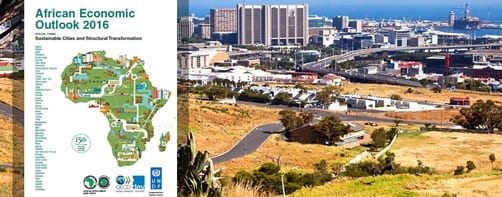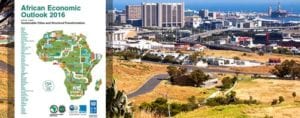 With two-thirds of Africans expected to live in cities by 2050, how Africa urbanises will be critical to the continent’s future growth and development.
With two-thirds of Africans expected to live in cities by 2050, how Africa urbanises will be critical to the continent’s future growth and development.
Rapid urbanisation
The continent is urbanising at a historically rapid pace coupled with an unprecedented demographic boom: the population living in cities has doubled from 1995 to 472 million in 2015. This phenomenon is unlike what other regions, such as Asia, experienced and is currently accompanied by slow structural transformation, says the report’s special thematic chapter. According to the authors, lack of urban planning leads to costly urban sprawl. In Accra, Ghana, for example, the population nearly doubled between 1991 and 2000, increasing from 1.3 million to 2.5 million inhabitants – a rise of 92%- at an average annual growth rate of 7.2%. Consequently, the ratio of population to total built up area decreased from 132 inhabitants/ha to 90 inhabitants/ha at an average annual rate of 4.6%, much higher than the global average of 2.1% during the same period. Urbanisation is a megatrend transforming African societies profoundly. Two-thirds of the investments in urban infrastructure until 2050 have yet to be made. The scope is large for new, wide-ranging urban policies to turn African cities and towns into engines of growth and sustainable development for the continent as a whole. If harnessed by adequate policies, urbanisation can help advance economic development through higher agricultural productivity, industrialisation, services stimulated by the growth of the middle class, and foreign direct investment in urban corridors. It also can promote social development through safer and inclusive urban housing and robust social safety nets.Finally, it can further sound environmental management by addressing the effects of climate change as well as the scarcity of water and other natural resources, controlling air pollution, developing clean cost-efficient public transportation systems, improving waste collection, and increasing access to energy.
This approach includes stepping up investment in urban infrastructure, improving connectivity with rural areas, better matching formal real estate markets with the housing demand by clarifying land rights, managing the growth of intermediary cities, and improving the provision of infrastructure and services within and between cities. Such investments need to be accompanied by productive formal employment – especially for the youth – and sufficient public goods.






